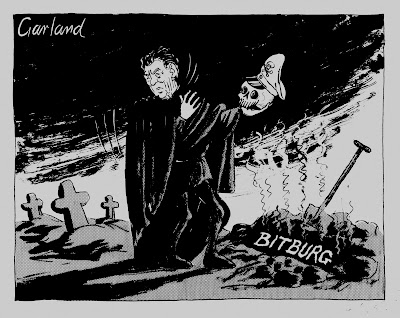The second teaching aid I am creating for the British Cartoon Archive's JISC funded CARD project is a selection of cartoons on the theme of 'Memory and Remembrance'. Inspired by both the work and teaching of my colleague Dr Stefan Goebel this group looks at the reappropriation of symbols generated by heroism, conflict and loss in British cartoons.
One sub-theme within this group looks at physical and imaginative memories of 'The Fallen' and how they both shape and are manipulated by politics and culture. A taster of this work can be found below...
(c) British Cartoon Archive, University of Kent, Nicholas Garland, Daily Telegraph, 30 Apr 1985.
As Jay Winter writes, however we might wish to believe otherwise, remembrance is political. When US President Ronald Reagan visited West Germany in Spring 1985 to mark the 40th anniversary of VE Day his choice of locations (and indeed those of his host Chancellor Helmut Kohl) were consciously political, chosen to foster reconciliation by establishing the events of World War Two as a shared tragedy (these one time combatants were now, of course, allies). The itinerary however included a visit to Kolmeshohe Cemetery at Bitburg, a site at which 49 members of the Waffen SS were buried. When this was leaked to the press a huge controversy ensued (interestingly Reagan’s chief of staff, Michael Denver, had failed to notice the names on the graves on a preparatory visit due to heavy snowfall). Despite protests from Jewish Americans, Reagan pressed on with the visit and joined Kohl on 5 May 1985 to lay wreaths at a wall of remembrance.
The visit was ‘saved’ by former Nazi Luftwaffe pilot and later NATO General Johannes Steinhoff, who in an impromptu act reached and shook the hand of his former belligerent General Matthew Ridgway, commander of the 82nd Airborne during World War Two. This, alongside a well pitched speech from the ever theatrical Reagan, gained the visit unexpected credit. Garland anticipates how Reagan was expected to emerge from the Bitburg, using the exhumation of Yorick in Shakespeare’s Hamlet to mock Reagan (who famously was a Hollywood actor before turning to politics). While Hamlet touchingly remembers the court jester he once knew, Reagan turns in horror from the Nazi before him (which, as a side note, is possibly a visual quotation to the Nazi villains in Steven Spielberg’s 1981 film Indiana Jones and the Raiders of the Lost Ark, one of the highest-grossing films of the decade).

No comments:
Post a Comment